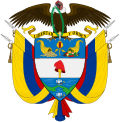| President of the Chamber of Representatives | |
|---|---|
 Seal of the Chamber of Representatives | |
| Chamber of Representatives of Colombia | |
| Style |
|
| Status | Presiding officer |
| Seat | National Capitol, Bogotá |
| Nominator | Major parties (normally) |
| Appointer | Chamber of Representatives |
| Term length | One legislative year |
| Constituting instrument | Constitution of Colombia |
| Formation | 20 July 1882 |
| First holder | Pedro Gual Escandon |
| Deputy | First Vice President Second Vice President |
| This article is part of a series on the |
| Politics of Colombia |
|---|
 |
The president of the Chamber of Representatives of Colombia commonly known as the president of the Chamber is the highest authority of the Chamber of Representatives of Colombia. The office was established in 1811 by the First National Congress of Colombia.
It is third on the presidential line of succession after the vice president and the president of the senate. [1]
The office is currently held by Julián David López of the Union Party for the People. He was elected on 20 July 2025.
